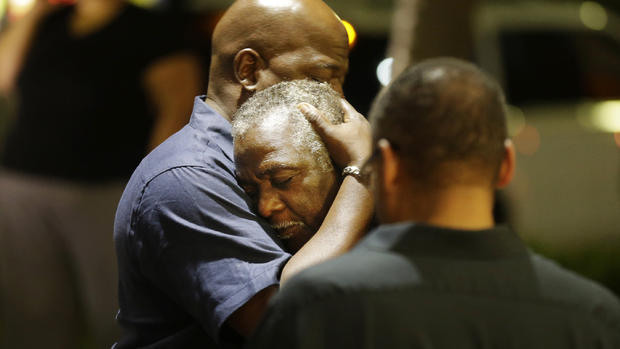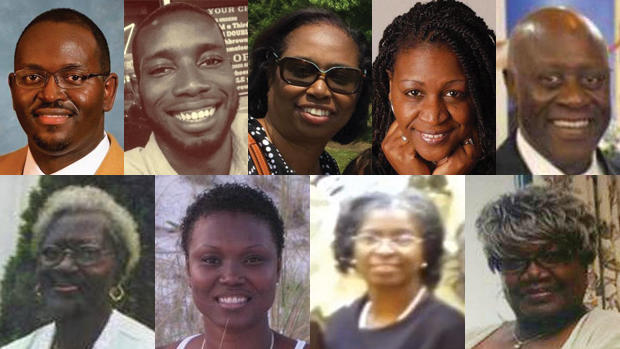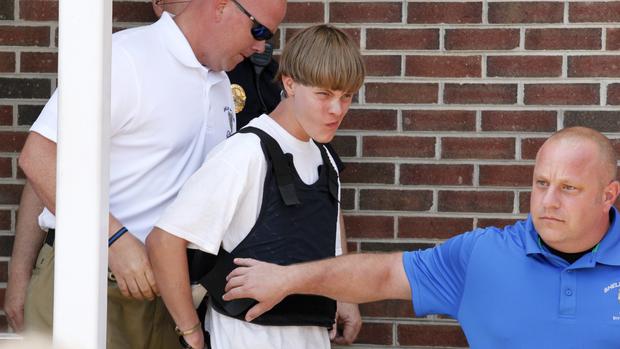Suspect in deadly church rampage back in Charleston
CHARLESTON, S.C. -- A white man who joined a prayer meeting inside a historic black church and then fatally shot nine people was captured without resistance Thursday after an all-night manhunt, Charleston's police chief said.
Dylann Roof, 21, spent nearly an hour inside the church Wednesday night before killing six women and three men, including the pastor, Chief Greg Mullen said.
According to a law enforcement source, an eyewitness told authorities that Roof stood up in The Emanuel African Methodist Episcopal Church and said he was there to shoot black people and then made some derogatory remarks, CBS News senior investigative producer Pat Milton reports.
In Shelby, North Carolina, nearly four hours away, Police Chief Jeff Ledford said his department received a tip about a possible sighting of Roof's vehicle Thursday morning. Two officers spotted the vehicle, stopped it and identified the driver as Roof, Ledford said.
During a court appearance Thursday afternoon in North Carolina, Roof waived extradition. He also waived his right to counsel, meaning he will either represent himself or hire his own lawyer.
Roof was taken to a waiting police car wearing a bulletproof vest, with shackles on his feet and his hands cuffed behind his back. A short time later, law enforcement officers escorted him onto a private plane for the flight back to Charleston.
Charleston County Sheriff's Office officials told CBS affiliate WCSC-TV Roof will be held in isolation at the Al Cannon Detention Center.
He is expected to have a bond hearing on Friday and be charged with nine counts of murder.
A federal law enforcement source told CBS News that during his arrest, Roof made incriminating statements indicating he was involved in the shooting.
A .45-caliber gun was found in Roof's car, the law enforcement source told Milton. The gun was apparently purchased by Roof's father for his birthday, the source said. No other weapons were found in the vehicle.
The federal law enforcement source told CBS News that Roof had no address and was more or less homeless, moving around from place to place.
"You can't put your mind around it," the Rev. Norvel Goff, a presiding elder of the African Methodist Episcopal Church in South Carolina, said about the shooting on "CBS This Morning" Thursday. "You cannot identify this kind of evil on this level because it is so horrific and unbelievable."
Charleston Mayor Joseph P. Riley Jr. called it "pure, pure concentrated evil." Stunned community leaders and politicians condemned the attack, and Attorney General Loretta Lynch said the Justice Department has begun a hate crime investigation.
President Obama, who personally knew the slain pastor, state Sen. Clementa Pinckney, said these shootings have to stop.
"At some point, we as a country will have to reckon with the fact that this type of mass violence does not happen in other advanced countries," Mr. Obama said.
Pinckney, 41, was a married father of two who spent 19 years in the South Carolina legislature. He became the youngest member of the House when he was first elected as a Democrat at 23.
"He had a core not many of us have," said Sen. Vincent Sheheen, who sat beside Pinckney in the Senate. "I think of the irony that the most gentle of the 46 of us - the best of the 46 of us in this chamber - is the one who lost his life."
The other victims were identified as Cynthia Hurd, 54; Tywanza Sanders, 26; the Rev. Sharonda Singleton, 45; Myra Thompson, 59; Ethel Lance, 70; Susie Jackson, 87; the Rev. Daniel Simmons Sr., 74; and the Rev. DePayne Middleton-Doctor.
Sanders had recently graduated from Allen University. Hurd worked for Charleston County's library system for 31 years. Middleton-Doctor was an enrollment counselor at Southern Wesleyan University's Charleston Campus, according to a friend.
Charleston County Coroner Rae Wooten said autopsies would be conducted over the next several days and did not have specific information on how many times the victims were shot or the locations of their injuries.
Roof's childhood friend, Joey Meek, alerted the FBI after recognizing him in a surveillance camera image, said Meek's mother, Kimberly Konzny. Roof had worn the same sweatshirt while playing Xbox video games in their home recently.
"I don't know what was going through his head," Konzny said. "He was a really sweet kid. He was quiet. He only had a few friends."
Roof had a criminal record. State court records show a pending felony drug case and a past misdemeanor trespassing charge.
He also displayed the flags of defeated white-ruled regimes: a Confederate flag was on his license plate, Konzny said. A photo on his Facebook page shows him wearing a jacket with stitched-on flag patches from Rhodesia and apartheid-era South Africa.
Roof wasn't known to the Southern Poverty Law Center in Montgomery, Ala., which tracks hate groups.
It's not clear whether he had any connection to the 16 white supremacist organizations operating in South Carolina, but he appears to be a "disaffected white supremacist," based on his Facebook page, said the center's president, Richard Cohen.
The shooting evoked painful memories of other attacks. Black churches were bombed in the 1960s when they served as organizing hubs for the civil rights movement and burned by arsons across the South in the 1990s. Others survived shooting sprees.
On "CBS This Morning," NAACP President Cornell William Brooks called the shooting "morally incomprehensible."
"We need to be clear about this," Brooks said. "This is not only the desecration of the sanctuary; it's a desecration of the soul of the country. The fact that you could have a criminal come into a Bible study - a Bible study is an occasion in which those gathered, who are there to study scripture, it is their responsibility to be welcoming.
"So the fact that you had someone with a gun, this person was likely welcomed, given a Bible, asked to have a seat and encouraged to be a part of this daily, I should say weekly, ritual. So it is morally incomprehensible. This is like a flesh and blood obscenity."
This particular congregation, which formed in 1816, has its own grim history: A founder, Denmark Vesey, was hanged after trying to organize a slave revolt in 1822, and white landowners burned the church in revenge, leaving parishioners to worship underground until after the Civil War.
This shooting "should be a warning to us all that we do have a problem in our society," said state Rep. Wendell Gilliard, a Democrat whose district includes the church. "There's a race problem in our country. There's a gun problem in our country. We need to act on them quickly."
"Of all cities, in Charleston, to have a horrible hateful person go into the church and kill people there to pray and worship with each other is something that is beyond any comprehension and is not explained," Riley said. "We are going to put our arms around that church and that church family."
A few bouquets of flowers tied to a police barricade outside the church formed a small but growing memorial.
"Today I feel like it's 9-11 again," Bob Dyer, who works in the area, said after leaving an arrangement of yellow flowers wrapped in plastic. "I'm in shock."
The attack came two months after the fatal shooting of an unarmed black man, Walter Scott, by a white police officer in neighboring North Charleston, which increased racial tensions. The officer awaits trial for murder.
Scott's family said in a statement that they were "thankful" for Roof's arrest.
"It is our hope that justice will come swiftly," the family said.
The shooting of Scott prompted South Carolina to pass a law, co-sponsored by Pinckney, to equip police statewide with body cameras.
"I am very tired of people telling me that I don't have the right to be angry," community organizer Christopher Cason said. "I am very angry right now."


